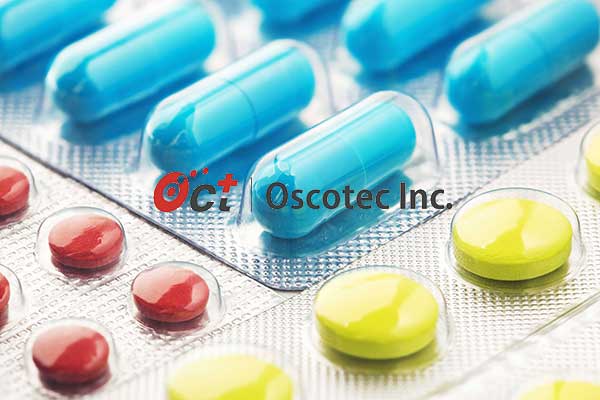Korea Biomedical Review is publishing a series of articles to analyze the top 10 Korean pharmaceutical and biopharma companies with the largest market capitalizations listed on the main bourse, Kospi, and the tech-heavy Kosdaq. The series aims to reflect key industrial issues and the flow of the capital market in the Korean pharmaceutical and biopharma industry. This is the eighteen installment. -- Ed.

Oscotec is expected to turn profitable next year after securing additional technology fees and royalties for Leclaza, a non-small cell lung cancer (NSCLC) treatment that it licensed out to Yuhan Corp. in 2015.
Oscotec is the parent company of Genosco, the original developer of Leclaza.
Hanyang Securities analyst Park Jae-gyeong said while the company sales had temporarily increased to 43.5 billion won in 2020 when the technology fee for Lazertinb was reflected, without any additional momentum, sales fell to 3.9 billion won in 2021 and 5.1 billion won in 2022.
Park expected Oscotec's annual sales to reach 5.2 billion won ($3.9 million) in 2023.
Operating profit also briefly returned to the black in 2020, but has been in the red ever since.
From a loss of 19.9 billion won in 2019, operating profit turned to black with 1.6 billion won in 2020.
However, it again turned red the following year, with a loss of 28.1 billion won in 2021 and 28.6 billion won in 2022. This year, Park stressed that she expects a loss of 31.2 billion won.
In contrast to the company’s recent sluggish business performance, Park forecasted Oscotec's sales and operating profit in 2024 will be 69.1 billion won, and 26.5 billion won, respectively.
The reason for the expected steep improvement is the positive outlook of the technology fees and royalties related to Leclaza.
Under the license deal in 2015, Yuhan said it would conduct phase 2 clinical trials at home and abroad, and if a technology transfer agreement was signed with a global pharmaceutical company after clinical development, Yuhan would share the technology transfer income in a 6:4 ratio.
In 2018, Yuhan signed a technology transfer agreement with Johnson & Johnson subsidiary Janssen worth $1.25 billion.
The amount received to date from Janssen represents 12 percent of the total contract value. The remaining contract value is approximately $1.25 billion, which meant that Oscotec could earn up to 560 billion won in technology fees.
If the global phase 3 clinical trial of Leclaza conducted by Yuhan and Janssen is successful and the U.S. Food and Drug Administration (FDA) approves the product, Oscotec can expect to receive an even larger payment thanks to the royalties provided based on sales.
Steady revenue is also expected from royalties from Leclaza's domestic sales.
Although the agreement's details have not been fully disclosed, industry watchers speculate that Oscotec receives around 10 percent of domestic sales of Leclaza from Yuhan.
According to a public filing made by Oscotec earlier this year, it recognized 1 billion won in Lazertinib royalties as revenue last year.
Park stressed that the amount of royalties Oscotec will receive is expected to increase significantly if Leclaza is approved as a first-line treatment in Korea.
Yuhan had previously estimated that Leclaza sales as a first-line treatment would be around 100 billion, which means Oscotec will secure annual sales of 10 billion won.
Follow-on pipeline in development
Oscotec is also accelerating the development of cevidoplenib, an immune thrombocytopenia (ITP) treatment.
In February, Oscotec announced top-line results from its Phase 2 trial of cevidoplanib. However, as the results did not achieve statistical significance and did not demonstrate the drug's efficacy, the market took it as a clinical failure.
However, at the European Hematology Association (EHA 2023) in Germany on June 11, the company presented top-line results from the phase 2 study and highlighted that cevidoplanib significantly improved platelet levels in patients with refractory ITP compared to existing therapies.
The company is aiming to license out the candidate before entering the phase 3 clinical trial.
The company is also well funded to continue R&D, thanks to the 88.6 billion won it raised in a capital increase last November.
As of the first quarter of 2023, Oscotec's cash and cash equivalents, including other financial assets, amounted to 105.9 billion won. Other financial assets accounted for 103.8 billion won, mostly short-term financial instruments such as deposits.
Related articles
- [Top K-Pharma Analysis ⑰] Analysts show high expectations for PharmaResearch, citing the global expansion of Rejuran
- [Top K-Pharma Analysis ⑯] Hugel accelerates global expansion following record-breaking sales
- [Top K-Pharma Analysis ⑮] ST Pharm turns from white elephant to cash cow for Dong-A Socio Holdings
- [Top K-Pharma Analysis ⑭] Medytox's market cap doubles in 4 months
- [Top K-Pharma Analysis ⑬] Caregen bullish on 2023 sales, targets more than double growth
- [Top K-Pharma Analysis ⑫] Alteogen to start reaping benefits from its licensing agreements
- [Top K-Pharma Analysis ⑪] HLB needs to start showing results

